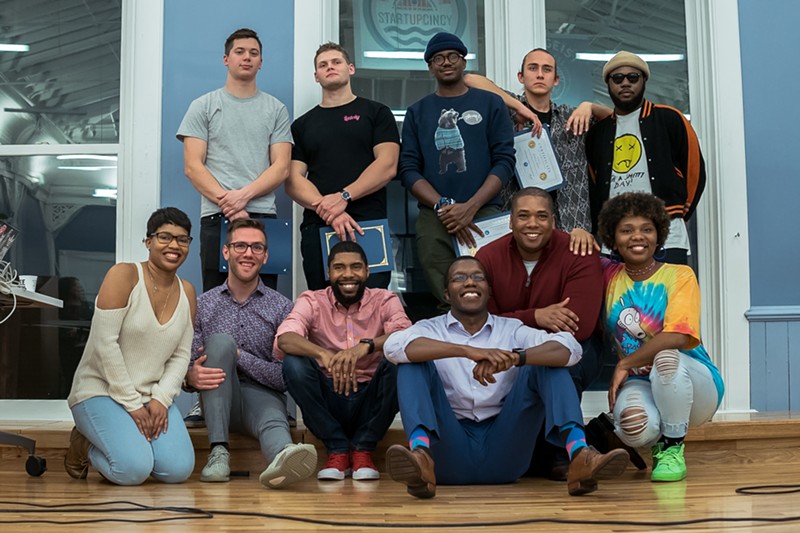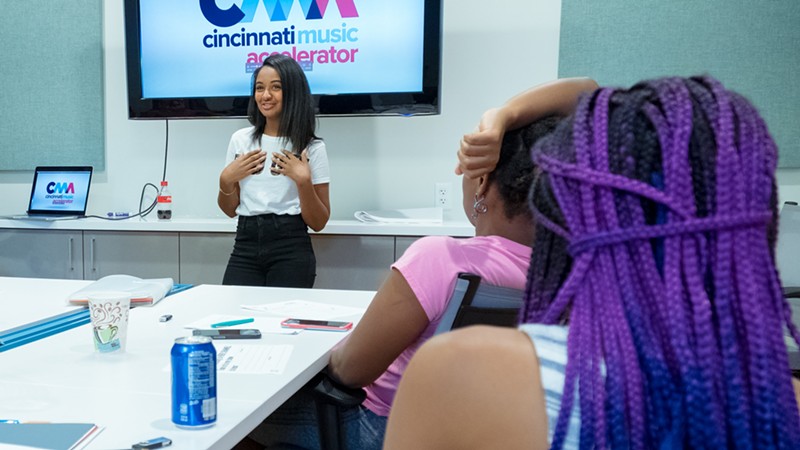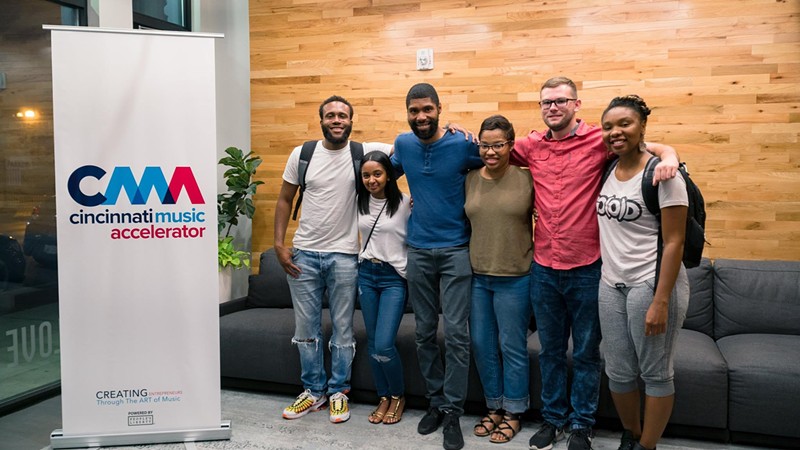
Cincinnati Music Accelerator (CMA) has expanded its educational offerings for musicians through a reboot of its business program.
The new program is officially called the Music Business Academy. In it, artists learn how to strengthen their careers through classes in finance, monetization, music licensing, entertainment law, marketing and branding and other skills.
The program is made possible by a Black Empowerment Works grant of $25,000, which was awarded to CMA through United Way.
CMA was founded in 2017 by Kick Lee, a music producer who now serves as CMA’s executive and creative director. The nonprofit organization provides essential tools and resources to help independent musicians jumpstart and sustain creative careers. Businesses and individuals can book talent through CMA, and CMA artists have performed at a variety of public events. Their goal is to “end the cycle of starving artists,” and their mission is to “establish Cincinnati as a music city,” according to the organization’s website.
The first iteration of CMA’s music business program featured regular, two-hour classroom instruction. When the COVID-19 pandemic affected in-person programming, CMA offered virtual classes for free. But Lee says the course lost some of its value this way, prompting CMA to reflect on the program’s direction. The Music Business Academy now provides enhanced instruction that artists can put to immediate use. The re-branded name is inspired by another Queen City educational institution.
“I befriended the leaders of the Art Academy (of Cincinnati),” Lee tells CityBeat. “Seeing how they’re structured and how they operate really inspired me to say, ‘Damn, I want to mirror our organization and this program like that.’ I want it to be free-thinking and open but also inviting for all that are in the music arts.”
Lee and CMA have partnered with the Art Academy in the past for workshops about the music industry and for other multidisciplinary arts initiatives.
CMA serves about 300 musicians and compensates about 180 artists every year through bookings and events. As an educational institution, it aims to enable students to become entrepreneurs in the music industry.

“We’re providing you resources and educating you on those resources, how they work and operate. We take things that you use in everyday life, like your finances, trying to promote yourself, bringing in clientele,” says Lee. “We teach you how those subjects function and operate so that you better understand, ‘if I do this, I can apply that here’ and vice versa.”
A key component to CMA’s philosophy, Lee says, is that it’s not enough for artists to be talented enough to book gigs — they need to be able to handle their business as professionals. That means keeping track of capital, having business and savings accounts, sending invoices and maintaining a knowledgeable and professional demeanor when working with clients.
Sam Martin, CMA’s director of operations, says the Music Business Academy falls right in line with their mission to help musicians sustain careers.
“I think the Business Academy takes that to the next level and helps artists become ‘self-sufficient,’” Martin says.
Martin oversees the organization’s daily operations, onboards and books talent, and interacts with CMA clients regarding current and future bookings, which he calls “activation.” Some of CMA’s recurring clients include Coffee Emporium, Cobblestone, Findlay Market and CVG Airport where CMA artists perform.
“I value helping Cincinnati artists and providing the platform to cultivate their passion into a career,” Martin says.
Emily Ward, a CMA regional ambassador in Columbus, shares a similar desire: to help artists succeed by providing an educational toolkit. She assists Martin with daily operations while also planning and structuring the Music Business Academy, recruiting prospective musicians and maintaining communication with artists and CMA staff.
“This intense, immersive program is a streamlined version of all information one needs in order to be successful in their artistic endeavors,” Ward says of the Music Business Academy. “I hope that our CMA students will learn about the supporting activities that are necessary to push their music and following to the next level.”
Local musical artist Deuces is a CMA alumnus. He says the education he received “still holds great weight and value” upon his current career, describing how vital it is to understand the business side of the music industry.
“I’ve basically learned the handbook of being a successful creative and entrepreneur,” Deuces says. “I’ve learned a lot from CMA, from how the entertainment world works, how to make money multiple ways, how to run a business as a creative, understanding how to navigate my way through the entertainment industry, communication (which is critical), workflow, cooperation, urgency, patience and, most importantly, self value.”
Through CMA, Deuces has performed consistently at live events, worked as a sound technician, toured in Memphis and created a Hip Hop pod play with Cincinnati Playhouse in the Park titled The Edge of Town.

Another program CMA offers is called the Street Stage Project in which students busk on the streets downtown and in Over-the-Rhine, every single day, during the spring and summer. A cornerstone of that project — which is a partnership between CMA and 3CDC — is that students receive compensation through tips and a small stipend provided by CMA.
“Something that someone told me that I’m going to keep saying is, ‘We’re working to put a song to every street because we’re dubbed the city that sings,’” Lee says. “It kind of mirrors ArtWorks’ initiative of having a mural in 52 neighborhoods. If we can do that, if we can build that, we can have a sustainable system for musicians to have recurring gigs and sustain a living for themselves and their families.”
Lee says CMA is working with the Playhouse to develop performance workshops that are framed around stage presence. Artists will learn proper techniques and practices related to lighting, cabling, microphone positioning and sound engineering — detailed habits that set amateurs apart from professionals.
“As a performer, you need to know these things. We see the front end of performance but we never see the back end,” Lee says. “That’s the premise of CMA. We’re the back end of it, teaching you the things so that when you go somewhere, you don’t look confused or caught off-guard and people look at you like, ‘I can manipulate you. You’re a professional, you should know this.’ It’s to help prevent that. That’s what a lot of the musicians that we work with go through.”
Additionally, CMA plans to expand its touring program to other cities. It completed the pilot phase of the tour, transporting the CMA stage trailer and performing in Memphis and Detroit. The team is planning to go to Chicago and potentially Austin next. The goal of these tours, Lee says, is to partner with similar organizations in other cities to establish a cross-collaborative exchange. They connect with organizations to embed themselves in events so that CMA artists are part of the performance lineup, alongside that city’s own artists.
Ideally, the tour attracts new talent and business leaders in the music industry so that they count the Queen City among go-to industry towns.
“Cincinnati has a strong potential to be a music city,” Lee says. “I’m going to everything I can to see us get to that point and to build a sustainable music ecosystem here.”
The program fee for CMA’s Music Business Academy is $150. Prospective students can add their name to the waitlist online to be notified about availability.
Learn more about the CMA’s Music Business Academy at cincinnatimusicaccelerator.org.
Sign up for our weekly newsletters to get the latest on the news, things to do and places to eat delivered right to your inbox.

